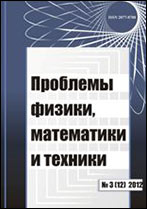|
|
Problemy Fiziki, Matematiki i Tekhniki (Problems of Physics, Mathematics and Technics), 2019, Issue 4(41), Pages 65–69
(Mi pfmt680)
|
 |
|
 |
This article is cited in 1 scientific paper (total in 1 paper)
MATHEMATICS
On one generalization of $\sigma$-local and Baer-local formations
V. G. Safonova, I. N. Safonovaa, A. N. Skibab
a Belarusian State University, Minsk
b F. Scorina Gomel State University
Abstract:
Throughout this paper, all groups are finite and $G$ is a group. Let $\sigma=\{\sigma_i\mid i\in I\}$ be some partition of the set of all primes $\mathbb{P}$.
Then $\sigma(G)=\{\sigma_i\mid \sigma_i\cap\pi(G)\ne\varnothing\}$;
$\sigma^+(G)=\{\sigma_i\mid G \text{ has a chief factor } H/K, \text{ such that } \sigma(H/K)=\{\sigma_i\}\}$. The group $G$ is said
to be: $\sigma$-primary if $G$ is $\sigma_i$-group for some $i$; $\sigma$-soluble if every chief factor of $G$ is $\sigma$-primary. The symbol $R_\sigma(G)$ denotes the product of all normal $\sigma$-soluble subgroups of $G$. The chief factor $H/K$ of $G$ is said to be: $\sigma$-central (in $G$) if $(H/K)\rtimes(G/C_G(H/K))$ is $\sigma$-primary; a $\sigma_i$-factor if $H/K$ is a $\sigma_i$-group. We say that $G$ is: $\sigma$-nilpotent if every chief factor of $G$ is $\sigma$-central; generalized $\{\sigma_i\}$-nilpotent if every chief $\sigma_i$-factor of $G$ is $\sigma$-central. The symbol $F_{\{g\sigma_i\}}(G)$ denotes the product of all normal generalized $\{\sigma_i\}$-nilpotent subgroups of $G$. We call any function $f$ of the form
$f:\sigma\cup\{\varnothing\}\to\{\text{formations of groups}\}$, where $f(\varnothing)\ne\varnothing$, a generalized formation $\sigma$-function and we put
$$
BLF_\sigma(f)=(G\mid G/R_\sigma(G)\in f(\varnothing) \text{ and } G/F_{\{g\sigma_i\}}(G)\in f(\sigma_i) \text{ for all }\sigma_i\in\sigma^+(G)).
$$
If for some generalized formation $\sigma$-function $f$ we have $\mathfrak{F}=BLF_\sigma(f)$, then we say that the class $\mathfrak{F}$ is Baer-$\sigma$-local and $f$ is a generalized $\sigma$-local definition of $\mathfrak{F}$. In this paper, we describe basic properties, examples, and some applications of Baer-$\sigma$-local formations.
Keywords:
finite group, generalized formation $\sigma$-function, Baer-$\sigma$-local formation, generalized $\{\sigma_i\}$-nilpotent group, Gaschütz product.
Received: 01.11.2019
Citation:
V. G. Safonov, I. N. Safonova, A. N. Skiba, “On one generalization of $\sigma$-local and Baer-local formations”, PFMT, 2019, no. 4(41), 65–69
Linking options:
https://www.mathnet.ru/eng/pfmt680 https://www.mathnet.ru/eng/pfmt/y2019/i4/p65
|

| Statistics & downloads: |
| Abstract page: | 303 | | Full-text PDF : | 101 | | References: | 43 |
|




 Contact us:
Contact us: Terms of Use
Terms of Use
 Registration to the website
Registration to the website Logotypes
Logotypes









 Citation in format
Citation in format 
